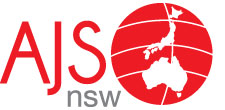Reports from recent AJS-NSW Events
Events 2018
Australia and Japan: Stronger defence ties - what does it mean?
with Dr. David Walton, Western Sydney University and Prof. Go Ito, Meiji University
Reporter: Philip Porter
June 19 2018
On Tuesday night 19 June, despite violent weather and Sydney traffic, a crowd of about 30 members and guests of AJS-NSW met at HWL Ebsworth Lawyers to hear a different discussion about the Australia -Japan relationship by Professor Go Ito from Meiji University and Dr David Walton from Western Sydney University. Different, because it was not about trade but something far more subtle; the evolution of post war diplomatic and strategic relations between the two countries. Dr Walton drew attention to these unseen relationships and their role in maintaining good communications and the strength and confidence of both countries to work together and not retreat or disrupt the connection when difficult issues arise. The most recent of these disruptions being the awarding of the submarine contract to France over Japan.. This is particularly significant given the Japanese felt they were the favoured bidder. Walton argues that despite this very large and public rejection the fundamentally strong relationship has not been damaged. This is not surprising when you consider the mutual respect both countries had developed for each other, rather neatly summed up by Ambassador McIntyre’s remarks in 1963: “I think we [External Affairs] are generally agreed that Japanese assessments particularly of Communist China are perceptive and of value to us. We not only want to make the Japanese feel they belong, we want to gain access to more of their serious thinking.” This generalised mutual support was made specific in strategic co-operation: 1980’s & 90’s: Leading roles in the formation of APEC; Peace keeping in Cambodia (1992 – 1993); Joint efforts to assist countries affected severely by the Asian Financial Crisis in the late 1990s; Annual bilateral dialogue on security matters was implemented in 1996 and a military attaché ́ system implemented in Canberra and Tokyo and Peace keeping in East Timor (1999- 2007) 2003: A Memorandum of Understanding on Combating International Terrorism between Australia and Japan; Trilateral Security Dialogue at the Vice ministerial level (Head of Department) 2005: Australian soldiers protected Japanese SDF personnel in Al-Muthanna Province, Iraq. This served to highlight the US alliance and support for Japan’s efforts to contribute to international issues. 2006: A range of security upgrades based on ‘Building a Comprehensive Strategic Relationship.’ The goals included:
2007-Joint Declaration on Security Co-Operation (JDSC) This culminated in the JDSC which was an action plan with specific measures (referred to as implementation), the most significant being; The regular Foreign Affairs and Defense meetings at the ministerial level known as ‘two plus two talks’. |
Professor Ito looked at the future of the Australia/Japan relationship in the context of the rest of Asia and the United States. Central to Go’s thesis is the total disruption of traditional diplomatic and strategic interaction by President Trump’s transactional style based on a dangerous unpredictability (see cartoon) where traditional allies are offended and enemies embraced in the morning only to be loved or un-loved in the afternoon.
What, Ito asks, does this tell us about current US foreign policy and how will the rest of the world react, particularly Australia and Japan? Coupled with this disruptive unpredictability is the possibility of an isolationist prone US withdrawing troops from Japan and South Korea and other parts of the world leaving her allies to reconsider and reconstruct their foreign policy architecture. Ito then looks specifically at Australia’s ambiguous position in Asia considering its foreign policy symmetry with the US regarding the rise and rise of China which is not necessarily compatible with the view Japan takes of its nearest and most threatening neighbour. He also considers Australia’s “identity crisis” where it sees itself as part of Asia but, “Asian countries do not quite accept Australia’s various architecture proposals, regarding them as “advertisement balloons.” Where does this new foreign policy world order leave traditional allies, particularly those under the hegemony and military protection of the US, asks Go? He contends that they will be forced into new and or deeper relations with their immediate neighbours having to take up the trade and diplomatic slack left by America’s isolationism and general unpredictability. This will be seen in Europe and throughout Asia. Interestingly, the very academic co-operation between Meiji University and WSU through Professors Ito and Walton’s co-operative research, which produced this fine lecture under the aegis of the AJS, is an example of the type of deeper and more intense interaction needed by nations left “leaderless” by the loss of credibility and isolationist tendencies of their post World War 11 hegemon. One could characterize It as the gathering of “ronin” states either in search of a new master or finding support and succor by establishing strong and meaningful networks, at all levels, with traditional and new allies. Both Walton and Ito contend that because of the deep diplomatic ties between Australia and Japan developed since the 1950’s both countries are well placed to do the latter. The evening ended with very lively conversation on the topic over drinks and finger food. Missed out on this event? Below lists our upcoming events that you can attend: Upcoming events
|

